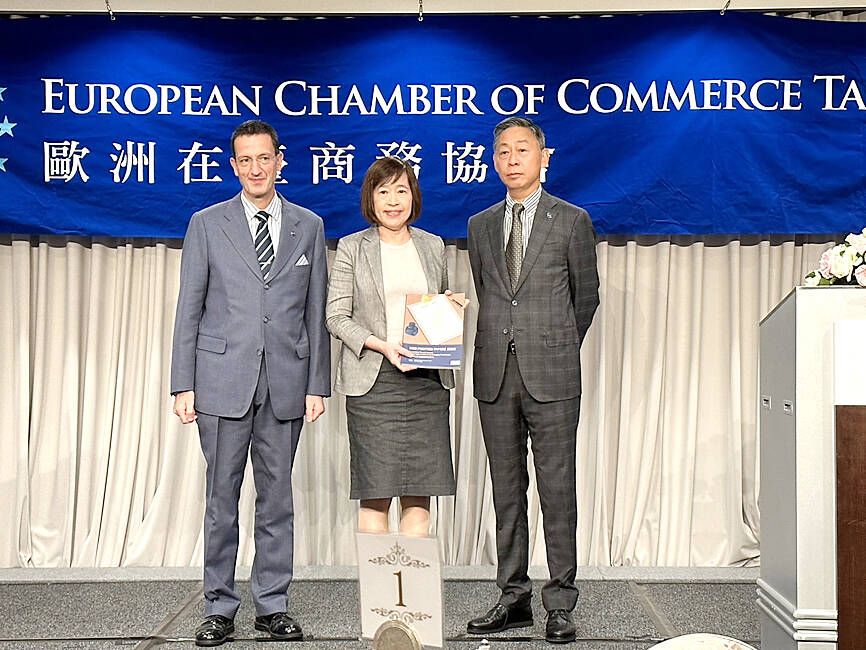The European Chamber of Commerce in Taiwan (ECCT) yesterday called on the government to seize the opportunity to ensure Taiwan’s continued success.
Taiwan has evolved as a beneficiary of an export-driven economy on the back of its contract manufacturing model and should step up its economic resilience and strength by partnering with foreign companies and countries, the chamber said when it released its annual position paper.
“Actions will be needed to speed up Taiwan’s energy transformation, attract and retain talent, enhance the conditions for developing innovative technologies and pursue further internationalization,” the paper said.

Photo: CNA
Countries and companies that are able to adapt to the changing needs of their trading partners and clients are best placed to thrive in the changing order, it said.
Taiwan’s effort to diversify investments and trade has had results, but more could be done in seeking stronger partnerships with like-minded countries, such as those in Europe, it said.
ECCT members welcome the government’s commitment and preliminary road map to achieve net zero emissions by 2050, but found that policymakers have fallen far behind their timetable goals.
For Taiwan to remain an attractive investment destination, the deployment of sufficient green energy is of utmost importance, it said, adding that the reduction of onshore wind and geothermal energy targets runs counter to the government’s objectives.
The rigid insistence on local content requirements and the lack of action to reduce red tape in administrative processes pose obstacles to renewable energy development, it said.
The chamber suggested the government develop all forms of renewable energy to the maximum extent possible, remove the cap on offshore wind energy auction prices, adopt a market-driven capital investment approach and streamline the permitting process for wind energy projects.
The government can help spur the sales of electric vehicles by modifying incentive schemes and tax policies, and revising land and building regulations to allow charging stations to be built in rural and urban areas, it said.
Taiwan’s labor laws fail to reflect the complexities of modern workplaces and remote working, the chamber said, adding that regulatory easing could help facilitate hybrid working.
Taiwan should consider providing subsidies or tax incentives for enterprises to provide childcare spaces and facilities, as the economic and social costs of raising children have increased, it said.
ECCT found the qualifications for the gold card scheme overly strict and called for relaxations to attract greater and more diverse foreign talent from Europe, the US and elsewhere in Asia, it said.

The US dollar was trading at NT$29.7 at 10am today on the Taipei Foreign Exchange, as the New Taiwan dollar gained NT$1.364 from the previous close last week. The NT dollar continued to rise today, after surging 3.07 percent on Friday. After opening at NT$30.91, the NT dollar gained more than NT$1 in just 15 minutes, briefly passing the NT$30 mark. Before the US Department of the Treasury's semi-annual currency report came out, expectations that the NT dollar would keep rising were already building. The NT dollar on Friday closed at NT$31.064, up by NT$0.953 — a 3.07 percent single-day gain. Today,

‘SHORT TERM’: The local currency would likely remain strong in the near term, driven by anticipated US trade pressure, capital inflows and expectations of a US Fed rate cut The US dollar is expected to fall below NT$30 in the near term, as traders anticipate increased pressure from Washington for Taiwan to allow the New Taiwan dollar to appreciate, Cathay United Bank (國泰世華銀行) chief economist Lin Chi-chao (林啟超) said. Following a sharp drop in the greenback against the NT dollar on Friday, Lin told the Central News Agency that the local currency is likely to remain strong in the short term, driven in part by market psychology surrounding anticipated US policy pressure. On Friday, the US dollar fell NT$0.953, or 3.07 percent, closing at NT$31.064 — its lowest level since Jan.

The New Taiwan dollar and Taiwanese stocks surged on signs that trade tensions between the world’s top two economies might start easing and as US tech earnings boosted the outlook of the nation’s semiconductor exports. The NT dollar strengthened as much as 3.8 percent versus the US dollar to 30.815, the biggest intraday gain since January 2011, closing at NT$31.064. The benchmark TAIEX jumped 2.73 percent to outperform the region’s equity gauges. Outlook for global trade improved after China said it is assessing possible trade talks with the US, providing a boost for the nation’s currency and shares. As the NT dollar

The Financial Supervisory Commission (FSC) yesterday met with some of the nation’s largest insurance companies as a skyrocketing New Taiwan dollar piles pressure on their hundreds of billions of dollars in US bond investments. The commission has asked some life insurance firms, among the biggest Asian holders of US debt, to discuss how the rapidly strengthening NT dollar has impacted their operations, people familiar with the matter said. The meeting took place as the NT dollar jumped as much as 5 percent yesterday, its biggest intraday gain in more than three decades. The local currency surged as exporters rushed to